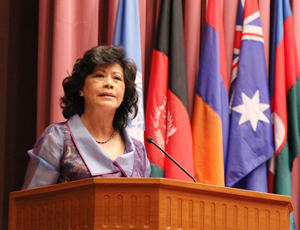 Dec. 24 – On Friday December 20, thirty-six Asia-Pacific nations unanimously adopted a landmark declaration outlining a roadmap towards a regional economic community.
Dec. 24 – On Friday December 20, thirty-six Asia-Pacific nations unanimously adopted a landmark declaration outlining a roadmap towards a regional economic community.
Deemed a “historic and defining moment” in the history of the UN Economic and Social Commission for Asia and the Pacific (ESCAP), the signing of the Bangkok Declaration on Regional and Economic Cooperation and Integration in Asia Pacific will bring ESCAP closer to ensuring “this will truly be the Asia-Pacific Century,” according to ESCAP Executive Secretary Noeleen Heyzer.
“This declaration holds the promise of region-wide cooperation and policy-making in finance, connectivity, and addressing shared vulnerabilities [by aiming] to build an integrated market, seamless transport and energy connectivity, financial cooperation, and enhance resilience to address vulnerabilities and risks of natural disaster,” she added.
The ESCAP Bangkok Declaration consists of four main action areas that will eliminate trade barriers and move closer to other forms of market integration, enhance financial cooperation and short-term liquidity support, increase governmental cooperation to address shared vulnerabilities and risks, and further connect regional energy, transportation, information, and communications technology.
“The true opportunity of a rising Asia-Pacific is to change the idea of progress – to prove that people and planet prosper best together,” Executive Secretary Heyzer stated, emphasizing the need for ESCAP’s member states to build a more resilient and integrated economic community through greater regional and national partnerships across the Southern hemisphere.
Mitigating Natural Disaster Risk
Last week’s meeting came as UN Secretary General Ban Ki-moon visited the Philippines to mobilize support for victims of Super Typhoon Haiyan.
In its year-end update report, ESCAP member states reiterated their concern that natural disasters could hinder their achievement of the UN Millennium Development Goals (MDG). In the 44-page report, ESCAP member states noted that when a portion of GDP is lost because of a disaster, progress towards the MDGs is inevitably hindered as resources are allocated to recovery and reconstruction rather than poverty reduction.
“As with other natural disasters, Typhoon Haiyan served as a stark reminder that several economies in the Asia-pacific region are the most vulnerable to climate-related disasters globally and are likely to be among the most affected by the consequences of a changing climate. The scale and impact of Haiyan underscores the need for further mainstreaming disaster risk reduction into development strategies,” the report noted.
According to ESCAP, small and medium-sized enterprises (SMEs) are most at risk because they often lack buffers against sudden, external shocks.
More than a Declaration
During the meeting’s opening ceremony, Timor Leste Premier Xanana Gusmao noted that the context and circumstances of every member state are different, and should be taken into account when advocating for regional cooperation. He advocated that rather than benefit transnational companies, ESCAP must aim to accelerate development for the people of the Asia-Pacific.
Participants planned a detailed follow-up plan to avoid the ESCAP Bangkok Declaration fading into obscurity. This plan includes the establishment of four expert working groups to propose steps to address each of the Declaration’s four action areas, and convening a second ministerial meeting on regional cooperation in 2015.
Alongside these initiatives, an inter-governmental process will be open to all ESCAP member states to receive the expert group reports and prepare for the planned biennial ministerial meetings.
According to the ESCAP Bangkok Declaration, ESCAP’s agenda is “an important step towards realising a broad long-term vision of an economic community of Asia and the Pacific.”
In closing the conference, Samoa’s Finance Minister Faumumina Tiatia Liuga nicely captured the essence of the conference by stating, “for us to be stronger, to be the number one region in the world, we need to support each other and help the weakest.”
You can stay up to date with the latest business and investment trends across Asia by subscribing to Asia Briefing’s complimentary update service featuring news, commentary, guides, and multimedia resources.
Related Reading
Mitigating Natural Disaster Risk in the Asia-Pacific Region
TPP Negotiations Conclude with No Deal in Sight
WTO Delivers Historic Trade Deal
ESCAP Economic and Social Survey of Asia-Pacific Region 2012


